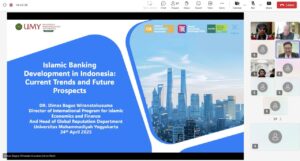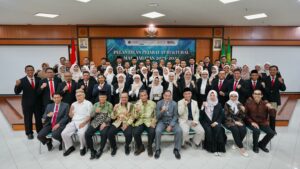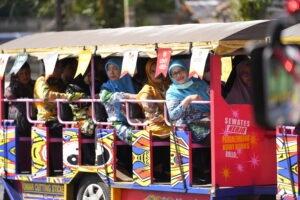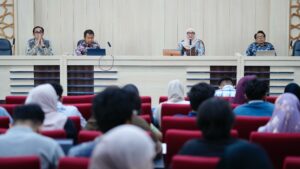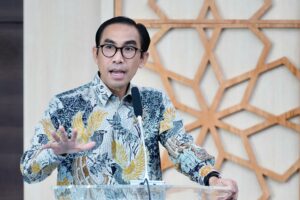Character building is one of the concerns of Muhammadiyah educational institutions since it is a spirit of each learning process to achieve educational goals set by Muhammadiyah. The ideas underlay a dissertation of Baidarus, M.M., M.Ag. entitled “Roles of Islamic and Muhammadiyah Education in Character Building of Students at Muhammadiyah High Schools in Pekanbaru. The Baidarus had his dissertation defense on Tuesday (15/5) at Graduate School of Univesitas Muhammadiyah Yogyakarta (UMY).
Baidarus, who is also Vice Rector of Universitas Muhammadiyah Riau, stated that Islamic and Muhammadiyah Education possesses essential roles in character building of students at Muhammadiyah high schools. “The character building was undertaken through Islamic and Muhammadiyah subjects,” he explained.
Baidarus mentioned that there were five attitudes showed by students after taking the Islamic and Muhammadiyah subjects. First, students became more religious and diligent to pray in congregation, recite Al-Qur’an, and do sunnah such as praying dhuha and fasting. Second, they turned moderate that they expresses affection, politeness, mutual support, and tolerance. Third, they were smart and intellectual that they looked enthusiastic about learning and reading. Fourth, they grew independent and disciplined. Last, students were able to cooperate with their colleagues that they demonstrated highly social solidarity.
The success of teaching the Islamic and Muhammadiyah values was because of the support of the educators. “The teachers applied several methods to teach the subjects such as a discussion, question and answer session, advice, motivation, and story telling of Islamic figures,” mentioned Baidarus.
Additionally, Baidarus became the 41st doctor of Program of Psychology of Islamic Education of Graduate School of UMY with a distinction value based on the assessment from dissertation supervisors and examiners, namely Sri Atmaja P. Rosyidi, M.Sc.Eng., Ph.D., P.Eng; Dr. Aris Fauzan, M.A.; Prof. Dr. Usman Abubakar, M.A.; Dr. Tasman Hamami, M.A.; Prof. Dr. Alef Theria Wasim, M.A.; Dr. Muhammad Anis, M.A.; Dr. Muhammad Samsudin, M.Pd.; and Dr. Abd. Majid, M.Ag.


